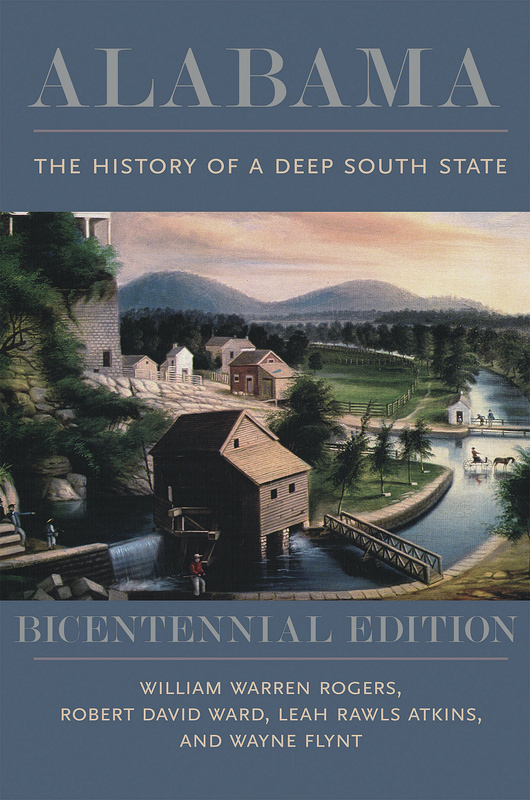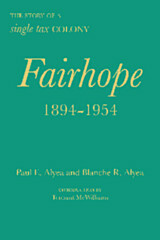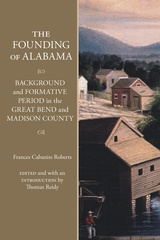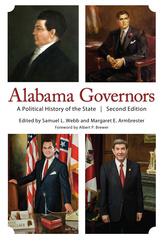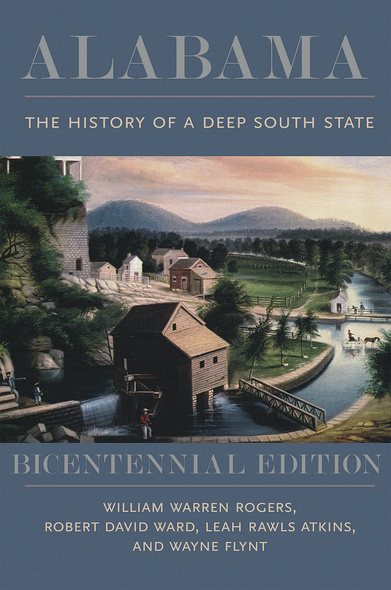
816 pages, 6 1/8 x 9 1/4
65 B&W figures - 11 maps
Paperback
Release Date:18 Sep 2018
ISBN:9780817359171
Hardcover
Release Date:18 Sep 2018
ISBN:9780817319748
Alabama
The History of a Deep South State, Bicentennial Edition
University of Alabama Press
A new and up-to-date edition of Alabama’s history to celebrate the state’s bicentennial
Alabama: The History of a Deep South State, Bicentennial Edition is a comprehensive narrative account of the state from its earliest days to the present. This edition, updated to celebrate the state’s bicentennial year, offers a detailed survey of the colorful, dramatic, and often controversial turns in Alabama’s evolution. Organized chronologically and divided into three main sections—the first concluding in 1865, the second in 1920, and the third bringing the story to the present—makes clear and interprets the major events that occurred during Alabama’s history within the larger context of the South and the nation.
Once the home of aboriginal inhabitants, Alabama was claimed and occupied by a number of European nations prior to becoming a permanent part of the United States in 1819. A cotton and slave state for more than half of the nineteenth century, Alabama seceded in 1861 to join the Confederate States of America, and occupied an uneasy and uncertain place in America’s post-Civil War landscape. Alabama’s role in the twentieth century has been equally tumultuous and dramatic.
General readers as well as scholars will welcome this up-to-date and scrupulously researched history of Alabama, which examines such traditional subjects as politics, military history, economics, race, and class. It contains essential accounts devoted to Native Americans, women, and the environment, as well as detailed coverage of health, education, organized labor, civil rights, and the many cultural developments, from literature to sport, that have enriched Alabama’s history. The stories of individual leaders, from politicians to creative artists, are also highlighted. A key facet of this landmark historical narrative is the strong emphasis placed on the common everyday people of Alabama, those who have been rightly described as the “bone and sinew” of the state.
Alabama: The History of a Deep South State, Bicentennial Edition is a comprehensive narrative account of the state from its earliest days to the present. This edition, updated to celebrate the state’s bicentennial year, offers a detailed survey of the colorful, dramatic, and often controversial turns in Alabama’s evolution. Organized chronologically and divided into three main sections—the first concluding in 1865, the second in 1920, and the third bringing the story to the present—makes clear and interprets the major events that occurred during Alabama’s history within the larger context of the South and the nation.
Once the home of aboriginal inhabitants, Alabama was claimed and occupied by a number of European nations prior to becoming a permanent part of the United States in 1819. A cotton and slave state for more than half of the nineteenth century, Alabama seceded in 1861 to join the Confederate States of America, and occupied an uneasy and uncertain place in America’s post-Civil War landscape. Alabama’s role in the twentieth century has been equally tumultuous and dramatic.
General readers as well as scholars will welcome this up-to-date and scrupulously researched history of Alabama, which examines such traditional subjects as politics, military history, economics, race, and class. It contains essential accounts devoted to Native Americans, women, and the environment, as well as detailed coverage of health, education, organized labor, civil rights, and the many cultural developments, from literature to sport, that have enriched Alabama’s history. The stories of individual leaders, from politicians to creative artists, are also highlighted. A key facet of this landmark historical narrative is the strong emphasis placed on the common everyday people of Alabama, those who have been rightly described as the “bone and sinew” of the state.
PRAISE FOR PREVIOUS EDITIONS
‘Fresh, compelling, insightful—the authoritative Alabama history for today’s readers and those of the 21st century.’
—Virginia Van der Veer Hamilton, University of Alabama at Birmingham
‘This work is authoritative, yet entertaining. Alabamians will not only understand their own rich heritage; they will experience anew the complex forces that have made Alabama what it is today.’
—Kenneth R. Johnston, University of North Alabama
‘Alabama history enthusiasts, teachers, and practitioners are encouraged to update their libraries with this new edition.’'
—Alabama Heritage
Leah Rawls Atkins served as the founding director of the Caroline Marshall Draughon Center for the Arts & Humanities at Auburn University from 1985 to 1995. Her publications include Developed for the Service of Alabama: The Centennial History of the Alabama Power Company, 1906–2006 and The Building of Brasfield & Gorrie.
Wayne Flynt is a distinguished university professor emeritus, Auburn University. He has published fourteen books, including, Poor but Proud: Alabama’s Poor Whites; Alabama Baptists; Alabama in the Twentieth Century; Southern Religion and Christian Diversity in the Twentieth Century; Mockingbird Songs: My Friendship with Harper Lee; and a memoir, Keeping the Faith: Ordinary People and Extraordinary Lives.
William Warren Rogers (1929–2017) spent nearly four decades as professor of history at Florida State University, where his first doctoral student was Wayne Flynt. Rogers authored more than two dozen books about Alabama, Georgia, and Florida, among them The One-Gallused Rebellion: Agrarianism in Alabama, 1865–1896, and coauthored, with Robert David Ward, Labor Revolt in Alabama: The Great Strike of 1894; August Reckoning: Jack Turner and Racism in Post-Civil War Alabama; and Convicts, Coal, and the Banner Mine Tragedy.
Robert David Ward (1929–2006) spent his teaching career at Georgia Southern University where he served as department chair, founding tennis coach, and a renowned teacher and director of theses
Wayne Flynt is a distinguished university professor emeritus, Auburn University. He has published fourteen books, including, Poor but Proud: Alabama’s Poor Whites; Alabama Baptists; Alabama in the Twentieth Century; Southern Religion and Christian Diversity in the Twentieth Century; Mockingbird Songs: My Friendship with Harper Lee; and a memoir, Keeping the Faith: Ordinary People and Extraordinary Lives.
William Warren Rogers (1929–2017) spent nearly four decades as professor of history at Florida State University, where his first doctoral student was Wayne Flynt. Rogers authored more than two dozen books about Alabama, Georgia, and Florida, among them The One-Gallused Rebellion: Agrarianism in Alabama, 1865–1896, and coauthored, with Robert David Ward, Labor Revolt in Alabama: The Great Strike of 1894; August Reckoning: Jack Turner and Racism in Post-Civil War Alabama; and Convicts, Coal, and the Banner Mine Tragedy.
Robert David Ward (1929–2006) spent his teaching career at Georgia Southern University where he served as department chair, founding tennis coach, and a renowned teacher and director of theses

